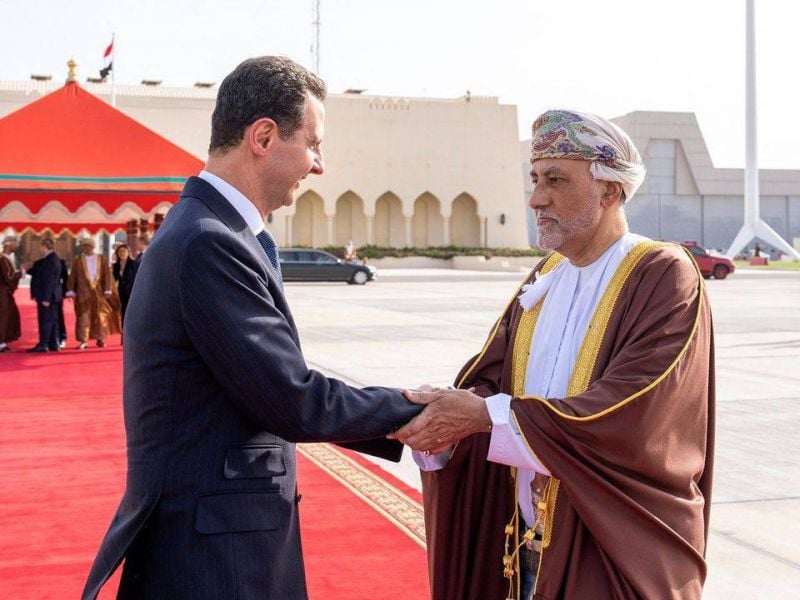
Syrian President Bashar al-Assad (left) welcomed with great fanfare by the Sultan of Oman during an official visit on Monday, February 20. (Credit: Oman News Agency/Reuters)
On Monday, images from Oman depicted blue skies, red carpets, and warm handshakes.
For the first time since the 2011 Syrian revolution, President Bashar al-Assad was received in Muscat on an official trip.
On the airport tarmac, Assad paraded alongside his Omani counterpart, surrounded by honor guards.
It appears that the Syrian president's “international pariah” status has started to change.
Over the past decade, Assad has rarely been seen outside Syria. But on Monday, Assad appeared to be at ease in Oman, which had withdrawn its ambassador from Syria in 2012 only to reinstate them eight years later.
Unlike its Gulf neighbors, Oman had always maintained contact with Damascus.
Assad’s violent repression of the popular uprising in Syria tarnished his ties regionally and internationally for years. His visit to Oman marks a symbolic turning point in Syria’s potential return to the Arab fold.
Earthquake diplomacy
Assad took advantage of the devastating Feb. 6 earthquake to break out of political isolation and his efforts have not gone unnoticed.
One of the first things he did was call for the lifting of Western sanctions on Syria, which he said were the main obstacle blocking humanitarian aid from reaching the country.
The disaster offered “Assad and his regional partners an opportunity to energize bilateral relations and promote engagement with the government in Damascus,” remarks Aron Lund, a researcher with the Swedish Defense Research Agency (FOI) and the Century Foundation.
A few hours after the earthquake, Egyptian President Abdel Fattah al-Sisi called Assad to offer his condolences and promise “emergency humanitarian aid.”
While the two countries did not sever ties amid the Syrian war, the telephone exchange was the first to occur between the two leaders since Sisi came to power in 2014.
This reinforced the Syrian government's claim that the position of Cairo “reflects the fraternal relations between the two countries and the two brotherly peoples.”
Nearly 10 days after the earthquake, Jordanian Foreign Minister Ayman Safadi visited Syria for the first time in 12 years.
During the trip, Safadi met his Syrian counterpart, Faisal Mekdad, in Damascus. A few days earlier, King Abdullah II of Jordan called Assad to express his condolences.
The Hashemite kingdom hosts over 650,000 refugees from neighboring Syria. Amman resumed contact with Damascus in the fall of 2021 with intentions to control the influx of refugees from Syria and to reduce the smuggling of Captagon pills — a drug that Assad’s regime reportedly produces — at its border.
The reconciliation between the two countries was marked by the reopening of the Jaber Nassib border crossing between Syria and Jordan.
“Most of the diplomatic activity that we have observed comes from nations that have already normalized their relations with Syria,” Lund said.
“But these countries have also taken the opportunity to strengthen their ties, with, for example, direct phone calls between Assad and the Egyptian president or the king of Bahrain,” he added.
Brake on Iran and Hezbollah
Amid the earthquake diplomacy, Saudi Arabia’s position caught particular attention.
According to a Saudi official quoted by AFP on Monday, Riyadh plans to deploy medical personnel to parts of Syria hit by the earthquake and has already sent aid to those affected in both rebel and government-controlled areas.
It was the Saudi foreign minister’s remarks on Saturday, during the Munich Security Conference, that especially came as a surprise.
“Within the Gulf Cooperation Council, but also in the Arab world, there is consensus that the status quo is no longer viable,” said Faisal bin Farhan bin Abdallah al-Saud.
“There will therefore have to be a dialogue with the government in Damascus at some point, so as to achieve at least the most important objectives, particularly with regard to the humanitarian aspect, the return of refugees, and so on,” Saud continued.
Saud’s remarks came a few weeks after he made a statement along similar lines.
There appears to be a change in Riyadh’s stance on Syria after it severed its relations with Damascus back in 2012.
In the early years of the Syrian conflict, Saudi Arabia had been the patron of Syrian rebels and openly supported the fall of the regime, even pledging to back international strikes against the Syrian government.
Undoubtedly, the “resumption of diplomatic relations with Syria and the reopening of the Saudi embassy in Damascus would constitute a huge victory for Assad, which would give him credibility and a stronger position in view of a broader normalization,” Dania Thafer, director of the Gulf International Forum, told L’Orient-Le Jour.
This would be a decisive success for Assad, especially considering Riyadh’s long-time stance against the Syrian regime.
But so far, “Riyadh still links normalization and dialogue with the regime to the resolution of the crisis and the humanitarian challenges facing the Syrian people,” said Thafer.
“The ideal, from the Saudi point of view, would be to use normalization to help or encourage Syria to extend its influence in Lebanon, in competition rather than in cooperation with Iran, to serve as a brake on Hezbollah,” Hussein Ibish, a researcher with the Arab Gulf States Institute in Washington, told L’Orient-Le Jour.
“But that doesn't seem plausible under the current circumstances. At a minimum, Saudi Arabia should ensure that normalization with Syria does not mean strengthening Iran and Hezbollah,” Ibish added.
Considering the Kingdom’s rivalry with the United Arab Emirates (UAE), Riyadh could also “refuse to get on the train of normalization with Damascus so as not to give the impression of following in the footsteps of Abu Dhabi,” Aziz Alghashian, a Saudi researcher, explained.
For several years, the UAE has instigated the restoration of diplomatic ties with Syria and has made clear its desire to bring the country back into the Arab fold.
The UAE’s stance did not generate the expected results however; the rest of the region’s countries remained cautious of Damascus.
But Abu Dhabi was not disheartened.
After the reopening of the Emirati embassy in Damascus at the end of 2018, UAE’s Foreign Minister Abdallah ben Zayed al-Nahyan met Assad in the fall of 2021.
The following spring, Assad was warmly received by the Crown Prince of Abu Dhabi Mohammad bin Zayed. It was his first trip to an Arab country since 2011.
After the quake, the UAE promised Damascus at least $100 million in aid and sent planes loaded with supplies. Almost a week ago, the Emirate foreign minister met with Assad in Damascus.
“The UAE’s involvement appears to be aimed at diversifying Abu Dhabi’s foreign policy and defusing external conflicts after the turbulent years following the Arab Spring,” Lund said.
“It is also an attempt on part of the UAE to use its economic muscles to ensure that Syria does not become completely beholden to Iran, even though it is clear to everyone that a breakdown of the Syrian-Iranian [alliance] is an unrealistic goal,” she added.
The post-war reconstruction of Syria is estimated to cost several hundred billion dollars. To the detriment of Iran, the UAE is seeking contracts for the reconstruction of several sectors which include public buildings and energy networks.
Reconstruction operations would however clash with the so-called Caesar sanctions imposed by the United States on Syria since the summer of 2020, which punish any person, company, or institution that trades with the Syrian government or contributes to the reconstruction of the country.
'A relatively low priority'
“Generally speaking, the region’s countries are increasingly seeking to deal with each other in a more pragmatic and less ideological way,” CEO of Gulf State Analytics Giorgio Cafiero told L’Orient-Le Jour.
“The rapprochement between Abu Dhabi and Doha or the reconciliation between Turkey, Israel, Egypt, the UAE, and Saudi Arabia is further proof of that,” added Cafiero.
Ankara has also changed its position on the Syrian government in recent months.
Having been the main sponsor of the Syrian rebels since 2011, Turkish President Recep Tayyip Erdogan said last November that a meeting with Assad was possible, stressing that there is “no place for resentment in politics.”
In December, the defense ministers of Syria, Turkey and Russia discussed “ways to resolve the Syrian crisis and the refugee issue,” and “joint efforts to combat extremist groups,” according to a statement from the Russian Defense Ministry.
Normalizing relations with the Syrian regime could help Ankara counter the Syrian-Kurdish militia of the US-backed People's Protection Units (YPG) and the Kurdistan Workers' Party (PKK), which the Turkish government perceives as a threat to national security. Assad wants to regain control of the territories that are currently held by the two Kurdish groups in the country’s north.
With Turkish elections set to take place in June, Erdogan plans to repatriate some 3.5 million refugees to Syria, a move that will win him favor with those who blame refugees for the dire economic situation in the country.
But for Ankara and others, the re-establishment of diplomatic ties with the Syrian regime comes at a price.
“Washington is not in favor of Arab countries normalizing their relations with Assad,” Cafiero said.
“The Biden administration US lawmakers have made clear their opposition to Arab-led efforts to restore the regime in Damascus.”
“However, should Assad return to the Arab fold, the US is unlikely to respond with anything other than angry rhetoric,” Cafiero said, adding that between the war in Ukraine, competition with China and Iran’s nuclear enrichment, “Syria is a relatively low priority for the Biden administration.”
This article was originally published in French in L'Orient-Le Jour. Translation by Sahar Ghoussoub.
